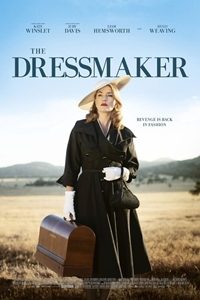 ‘The Dressmaker’ needs some alterations
‘The Dressmaker’ needs some alterations
Written/Directed by: Jocelyn Moorhouse
Starring: Kate Winslet, Judy Davis, Liam Hemsworth, and Hugo Weaving
“The Dressmaker” - “Make it work.” - Tim Gunn
For those not familiar with the reality television show “Project Runway”, Tim Gunn offers advice to contestants to help fix their fashion project challenges. When a dress looks to be in some trouble – with pattern, construction, color, and/or shape issues – Gunn offers guidance to help salvage a specific hot mess of fabric sitting on a plastic mannequin, and he usually concludes his consultation with the parting words, “Make it work.”
With limited time to pull together a great product, the competitors generally feel lots of stress during their televised periods of crisis, so Gunn is a most welcome face.
Tilly Dunnage (Kate Winslet) – a striking fashion designer who recently worked in London and Paris – is not a most welcomed face at her birthplace of Dungatar, a dusty, desolate town in the middle of nowhere in the Australian desert. With a collection of small wooden-framed houses, a general store and a tiny one-room school, Dungatar is an isolated village which time apparently forgot. Set in the 1950s, it has a distinctive, dystopian feel, like a spaghetti western shoot out is about to break out, and Tilly moves back to find an answer to a very important question.
She asks her mom (Judy Davis), “Am I a murderer?”
Australian writer/director Jocelyn Moorhouse is prepared to answer this question over the course of 1 hour and 58 minutes in her first film since 1997, and she includes many famous Aussies to help tell the story. Davis steals nearly every on-screen frame of the picture in an engaging and entertaining performance as Tilly’s alcoholic, shut-in mom. Liam Hemsworth is an attractive potential love interest. Hugo Weaving (who was not born in Australia but grew up there during a portion of his childhood) plays a friendly long arm of the law, and this leaves Winslet – from England - as the only non-Australian lead actor.
Dungatar’s residents have character as well, but the strange kind. Generally, they do not venture out of town all that often, and Moorhouse provides an eccentric atmosphere with several zany, slapstick-like sequences to accentuate their personas. After meeting some of the locals – and then later through purposely-designed, comedic sequences - the film suggests that Dungatar could be an endearing community, like the unforgettable, charming and tiny locale of Tullymore in “Waking Ned Devine” (1998). We get similar glances of charm here, but they do not mesh with the very dark matter of Tilly’s potentially-murderous act and many of the residents’ mean-spirited, tittle-tattle natures.
In one scene, an elderly pharmacist – bent over because of a bad back – runs through the streets with Keystone Kops-like music playing in the background, but in another moment, the film shows ugly flashbacks of kids bullying a young Tilly, which may have led to the previously-mentioned potential murder. The shifts in tones are terribly distracting and keep us guessing about what the movie is trying to convey. The general feeling, however, is that Tilly will face her past and hopefully break the invisible chains that have emotionally held her in check for decades. Her new Dungatar experience could become cathartic and transformational, as she begins to transform the town through her expert fashion skills as a dressmaker.
Before Tilly’s arrival, everything – including the physical environment, attitudes and clothing – seems to harshly bake in grays and browns because of the Australian sun, but she soon drapes Dungatar’s ladies with the latest fashions in gorgeous, bright reds, blues, greens, and whites. Visually, the contrast between the new attire and current environment clashes in the most glorious, cinematic ways.
In many ways, “The Dressmaker” is a visually beautiful film, and Moorhouse – 19 years since her last movie – has an astute eye of capturing attention-grabbing and pleasing optics. In addition, the four leads’ performances – and Tilly’s specific question – also keep us engaged.
Tilly’s past saw her as a victim and then – rightly or wrongly – a villain, but can she turn into a hero? The movie attempts Tilly’s internal makeover but conversely struggles in deciding what it (the film itself) wants to be.
A slapstick comedy? A dark, gloomy drama? A revenge picture? A redemption story? It does ultimately make a choice, but I feel it is a bad one. In fact, after one particular decision in the movie’s third act, it left me figuratively throwing my hands in the air in frustrating disbelief. Although some may appreciate the eventual direction of the story, it does not connect with much of the narrative that the film clearly lays out during Tilly’s time in Dungatar. The script feels a hot mess sitting on a fascinating physical and emotional foundation, and the right adjustments could have turned “The Dressmaker” into the one of the best films of the year.
It clearly is not, and I wish Moorhouse called an objective third party to review the script before filming. Perhaps, Tim Gunn was available. His pep talk and trademark message might have – at least - focused the writing. Unfortunately, as the movie stands, the filmmakers did not make it work. (2/4 stars)
Jeff – a member of the Phoenix Critics Circle – has penned film reviews since 2008 and graduated from ASU’s Walter Cronkite School of Journalism. Follow Jeff and the Phoenix Film Festival on Twitter @MitchFilmCritic and @PhoenixFilmFest, respectively.









